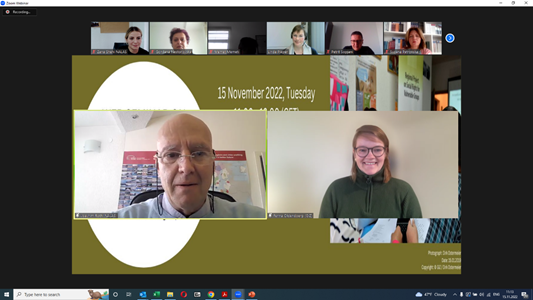
Is the fiscal decentralisation the main strategy for the countries in South-East Europe to face the financial challenges and to reinforce investments in local communities? What are the open issues related to the process of fiscal decentralization throughout the Region? Where and how should countries direct the future of fiscal decentralization?
These were some of the topics addressed within the International Conference: The Future of Fiscal Decentralization in South-East Europe, organized from 1-2 November 2012 in Hotel Splendid, Budva, Montenegro, by the Network of Associations of Local Government Authorities (NALAS), in partnership with the Ministry of Finance of Montenegro and the Union of Municipalities of Montenegro.
The Conference brought together over 120 participants, representing local authorities and local government associations from 12 countries in SEE; representatives of Ministries of Finance and other central government institutions from 7 countries; as well as financial institutions, international organizations, experts, CEOs and economists and boosted intergovernmental dialogue on the process of fiscal decentralization in SEE.
In his opening speech, the Minister of Finance of Montenegro, Mr. Milorad Katinic said: “Crises force us to be more efficient, to provide better services with the money we collect. But, we also have to create better environment for economic growth, that better heals poverty and employment”.
NALAS Vice-President, Mr. Anton Pershak said: “While assessing the trends in fiscal decentralization it is important to take into account the following general guiding aspects: (1) Implementation of the national fiscal decentralization reform agenda; (2) Level of the intergovernmental dialogue; and (3) Financial indicators. Regarding the first point, NALAS analyses conclude that there is no continuous progress in fiscal decentralization throughout the Region during the last 2-3 years. In Moldova and Romania, and even in my country, Slovenia, there is even a trend towards re-centralization”, said Pershak.
“We agree that the process of decentralization should be perceived as a consequence of the need for democratization of the society. The economic development on the local level is a key element of meeting the needs of the people. Local development and jobs are what people primarily expect from the process of decentralization”, said Mr. Aleksandar Bogdanovic, Mayor of Cetinje and President of the Union of Municipalities of Montenegro. “The policies implemented in Montenegro so far have given important results. I would remind that Montenegro, before the crisis, was one of the fastest growing economies in Europe, with the highest level of FDI per capita”.
“I often hear from central governments that municipalities do not have the capacities to implement the fiscal decentralization-and this is their excuse for not advancing the fiscal decentralization process. This is simply not a valid excuse. We all have to work together to further develop the capacities of the local governments”, said Ms. Ginka Chavdarova, Executive Director of the National Association of Municipalities of Bulgaria in her speech about the challenges of the local government associations in supporting their members, the local governments, to strengthen local administrative capacities.
“We have to emphasize that there are three important tracks in fiscal decentralization: increase of inter-governmental transfers, increase of own revenues and removing the burdens of municipal borrowing”, said Mr. Peter Clavelle, Chief of Party of the USAID Planning and Local Governance Project in Albania. “NALAS made a powerful study of the trends of fiscal decentralization in South-East Europe. We have used this study in our work in Albania and we have to continue doing so, we have to have an evidence-based approach in advancing fiscal decentralization”, stressed Mr. Clavell.
Mr. Anthony Levitas, a world-known expert in intergovernmental finance, alerted that: “The level of transfers from central to local governments is insufficient for them to deliver the services they are mandated to. Throughout the SEE Region, collecting taxes remains the main problem for both central and local governments, while the “blame-game” between the two continues. Also, tax base throughout the SEE Region is highly concentrated in a few cities, often the capital city”.
As stressed by Mr.Gabor Peteri, International Expert, World Bank SEE Municipal Finance Review, in the upcoming period, “Local governments should take real control over own revenues-base, rate, exemptions and revenue administration, find new resources and develop information base and knowledge for budget negotiations and policy making, but also benchmarking for improving service management”.
During the conference, the City of Rijeka, Croatia, presented its models for financing local development projects, while the City of Istanbul, Turkey, presented its innovative financing of bus procurement.
In small working groups, national delegations discussed the main accelerators for the progress in local investment and fiscal decentralization and the key elements of success for the future.
The conference ended with a Declaration, which emphasizes the joint efforts for:
-Improving the results of the dialogue between the Ministries of Finance and the national associations;
-Expanding the municipal investment capacity in order to overcome the continuing underfunding of the municipal infrastructure;
-Facilitating the access of the local government to the EU pre-accession and structural/agricultural funds;
-Facilitating the access to the credit market.
Download the Declaration: Budva Declaration on the Future of FD in SEE.pdf
To download NALAS Report: Fiscal Decentralization Indicators for South-East Europe 2006-2011, click HERE
To view Conference photos, click HERE
To download Conference presentations, click HERE (.zip archve).